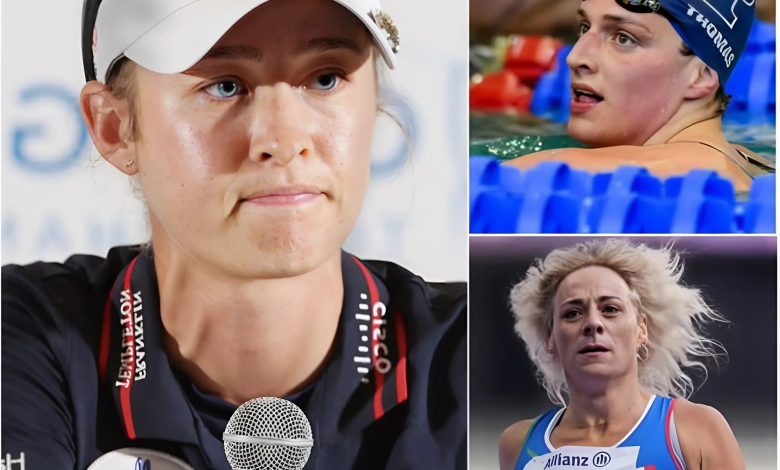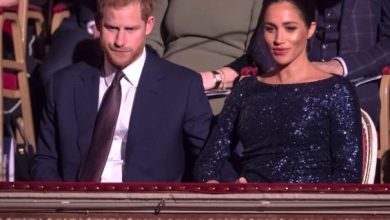“I Will Stop Supporting And Investing In The Olympics If They Go Back To L/G/B/T, And I Demand Fairness In The Competition. This Is Sports — Not A Platform To Promote Gender Equality. It Must Be Fair For Everyone.” — These are the words of nelly korda, after learning that Lia Thomas and Valentina Petrillo, two transgender athletes, have signed up to compete in the women’s category at the Olympics

When Nelly Korda declared, “I will stop supporting and investing in the Olympics if they allow L/G/B/T participation again… This is sport — not a platform for gender equality propaganda. We must ensure fairness for everyone,” she ignited a firestorm of controversy. Her words came shortly after she learned that Lia Thomas and Valentina Petrillo—two prominent transgender athletes—had registered to compete in women’s divisions at future Olympics. What followed was more than a media spectacle: it exposed a fault line in modern sport, between inclusion and fairness, between identity and competition.
Korda’s statement is provocative, blunt, and unyielding. It frames sport as a pure meritocracy rooted exclusively in the binary, biological assumptions of sex. In her view, allowing transgender athletes in women’s divisions upends the balance. By threatening to withdraw support and investments, she pressures the Olympic movement with leverage beyond athletic performance—money, reputation, and public sentiment. That gambit would force any organizing body to assess whether inclusivity’s moral call might be outweighed by financial risk.
At the heart of Korda’s demands lies the assertion of fairness. She insists sports regulators must protect a “level playing field.” Many who share her concern argue that even after hormone therapy and transition, transgender women retain physical advantages—strength, endurance, bone structure, or cardiopulmonary capacity—that confer an unfair edge in categories exclusively reserved for women. To them, the integrity of competition is threatened if biological distinctions are blurred. The requirement, then, is a reevaluation of rules: eligibility criteria, medical thresholds, and performance safeguards.
But Korda’s framing oversimplifies a more complex reality. For one, “L/G/B/T participation” is not a monolithic category. Transgender women, nonbinary athletes, and gay or lesbian athletes have very different relationships to competitive fairness. Lesbian or gay athletes typically raise no fairness concern, because sexual orientation does not alter biology. Transgender participation, however, sits in a more contested zone because of questions about physiology, hormone therapy effects, and residual advantages or disadvantages.
By conflating “L/G/B/T” into a single “movement,” Korda risks dismissing the distinct ethical and scientific debates that each identity raises. Worse, she frames inclusion as “propaganda,” an antagonistic and ideological intrusion into sport, which stokes division rather than nuance.
Consider Lia Thomas, the swimmer whose entry into women’s collegiate competition provoked intense debate. Advocates of inclusion point out that she met NCAA requirements for hormone suppression and that her participation provides visibility and human dignity to a marginalized group. Critics, however, warn that her results might illustrate precisely the advantage that skeptics fear. Valentina Petrillo, a high-profile track athlete, likewise embodies the real-life tensions of policy-making: she competes under evolving national and international rules that vary between jurisdictions.
Olympic organizers find themselves caught in the crossfire. On one side are traditionalists who insist sports must retain biological categories with strict definitions. On the other are activists who argue that exclusion of transgender athletes is discriminatory and undermines the very global, inclusive spirit the Games aspire to embody. Both sides appeal to core values—fairness, equality, respect—but those values sometimes conflict in practice.
Some proposed solutions attempt compromise. Multi-tiered categories, open divisions, or performance-based qualifying standards might allow athletes to compete with less direct advantage. Medical or hormonal thresholds, duration-of-transition rules, and individualized assessments have also been suggested. But every alternative slides into pitfalls: complexity, enforceability, and accusations of new kinds of unfairness.
Korda’s ultimatum—“stop investing if you allow this again”—places pressure on the Olympic movement from the economic side. She signals that elite athletes and sponsors may no longer stay silent. That threat holds weight: funding, endorsements, and advertisement dollars sustain the infrastructure of global sport. If enough prominent voices echo her stance, the Olympic rule-makers will find themselves under siege not only in ethical forums, but in boardrooms and finance committees.
Yet such hardline posturing also risks harming the very community Korda claims to protect—female athletes. If competition rules are drafted in reactionary backlash, women could lose opportunities or face arbitrary restrictions born of fear, not evidence-based policy. In its zeal to preserve purity, sport could become closed, rigid, and exclusionary—or worse, weaponized as a battleground for cultural wars outside its domain.
The deeper question is this: Can sport evolve to accommodate diversity without sacrificing fairness? The answer is not obvious. It demands openness to science, empathy to identity, and humility about the unpredictable intersections of gender, biology, and competition. It also requires leadership willing to hold difficult conversations, not simply draw red lines.
Nelly Korda’s statement may have been incendiary, but it forces the conversation into the open. We can no longer pretend that sport is immune to identity politics or gender discourse. The Olympics and their stakeholders must now decide: will they hold fast to a rigid binary, or will they chart a path where excellence and inclusion coexist? The alternative may well be the fragmentation of the games themselves—if athletes, fans, and money begin to take sides.




